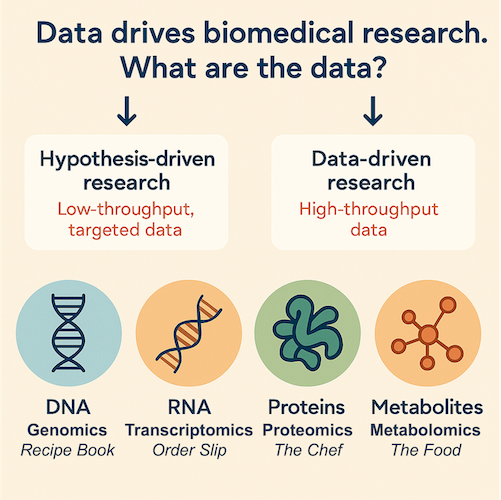Omics: From Tiny Molecules to Big Data
Data drives biomedical research. What are the data?
A few weeks ago, I published a short write-up explaining the data-driven paradigm in biomedical research and how data has become an integral part of the hypothesis generation process. Now let's focus on the data itself.
Both hypothesis- and data-driven research generate data, but the scale is different:
- Hypothesis-driven research generates low-throughput, targeted data (1-10 measured variables) using approaches like RT-PCR, ELISA, biochemical assays, etc.
- Data-driven research deals with high-throughput data (1000 to millions of variables measured simultaneously).
For simplicity, I will limit this post to high-throughput molecular biology data, often referred to as omics data. Omics data can be derived from different molecular components of biological systems, but I will highlight four key building blocks: DNA, RNA, proteins, and metabolites.
Understanding Molecular Systems Through a Restaurant Metaphor
To help with understanding, let's imagine our molecular system as a restaurant.
DNA --> Genomics
Genomics is the study of the whole genome, and its data originates from DNA, including DNA sequences, variations, and mutations.
DNA is the blueprint of our body, just like a recipe book in a restaurant. It has been passed down through generations—from your great-great-grandparents to your biological parents and finally to you.
Although you always follow the recipe book, you sometimes need to adjust ingredients based on what’s available in the kitchen. For example, if a recipe says to add one teaspoon of salt, but today's salt is stronger, you might reduce it to half. Similarly, DNA maintains the blueprint, but it adapts slightly to environmental and lifestyle factors. These adaptations are called mutations, which can be: Beneficial (e.g., higher resistance to diseases), Neutral (e.g., changes in eye color), Harmful (e.g., increased risk of diseases or chromosomal abnormalities)
RNA --> Transcriptomics
Transcriptomics refers to the study of the whole transcriptome. The data originates from RNA, which is transcribed from DNA and reflects gene expression dynamics under different conditions.
When a customer places an order in a restaurant, the waiter writes it down and gives an order slip to the kitchen staff. The lead chef then opens a specific page from the recipe book to prepare the requested dish. Since different customers have different food preferences, the dish might need adjustments, such as substituting ingredients for allergies. Similarly, depending on what your body needs, DNA provides instructions to RNA to create specific proteins at a given moment. For example:
- After a heart attack, many RNA (or gene) expressions in the heart change to compensate and repair the damage.
- RNA expression levels also change based on environmental exposure, diet, or stress levels.
Read more about my post on gene expression in heart attack here.
Note that DNA is usually very stable and rarely mutates, while RNA is much more flexible and dynamic, changing in response to the body's immediate needs.

(I pasted this blog to ChatGPT and this is the result, amazing. I just added minor things)
Proteins --> Proteomics
Proteomics is the study of all proteins in the body. Proteins are the translation results of RNA. In a restaurant, there is one lead chef and many specialized subordinate chefs, such as a pantry chef, grill chef, or sushi chef. Once the lead chef receives an order slip, they assign the task to the appropriate chef.
- If a customer orders grilled steak, the grill chef takes over.
- If sushi is ordered, the sushi chef steps in.
Similarly, your body requires different proteins in different conditions:
- After a meal, digestive proteins help break down food.
- After an injury, wound-healing proteins become active.
- During stress, heat shock proteins protect cells.
What Happens When Proteins Go Wrong?
Just like a chef can make mistakes—such as using the wrong ingredients—proteins can malfunction by misfolding, causing them to lose their function.
Fortunately, the body has quality control mechanisms to fix or remove misfolded proteins. However, if too many misfolded proteins accumulate, they can lead to diseases such as Alzheimer’s or Parkinson’s.
Metabolites --> Metabolomics
Metabolomics is the study of all small molecules (metabolites) in the body. Metabolites are the result of biological (or more precisely, biochemical) processes that reflect the body's current physiological state. In a restaurant, metabolites are like the dishes served to customers. The quality of the dishes depends largely on what ingredients are available in the kitchen. Similarly, our metabolites depend on our body's state—such as diet, exercise, disease, and environmental factors. For example, if a customer orders a vegan or lactose-free dish, the recipe will be adjusted accordingly. Likewise, our body produces different metabolites when we are sick.
However, sometimes food doesn’t turn out well, perhaps it is undercooked or has too much salt. Similarly, when metabolites are not produced correctly, they can lead to diseases such as diabetes or metabolic syndrome.
Summary: Small but mighty
Our body contains millions of molecules working together to keep us functioning. When we measure many of these molecules at the same time, we generate omics data, which is crucial in data-driven biology. Each molecule has its own specific role, much like the chefs and ingredients in a restaurant. I’ve also highlighted how things can go wrong, leading to various diseases. In my research, I aim to uncover what goes wrong in disease states by analyzing omics data.
That's not all the omics out there. There are many others, such as metagenomics, lipidomics, glycomics, and more.
Disclaimer: This analogy is not new. I came across the general idea many years ago, and it has stuck with me since, but I can't recall the exact source (apologies). I’m now explaining it in my own words and adding my own spin on the specific topics and diseases. If you are the original author of this idea, please let me know, and I will gladly give you credit.
